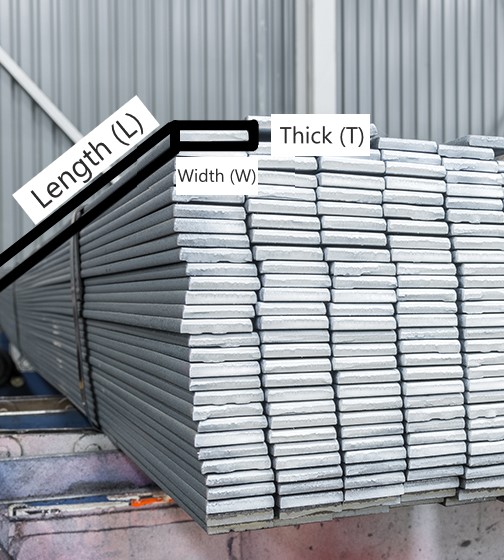The Weight of Tool Steel Flats calculator computes the average weight of steel flats based on the number and dimensions of the flats, and an average density of 7810 kg/m3 for tool steel flats.
INSTRUCTIONS: Enter the following:
- (n) Number of flats
- (L) Length of the flats
- (W) Width of the flats
- (T) Thickness of the flats
- (ρ) Density of metal
Weight of Tool Steel Flats (m): The function returns the weight in pounds. However this can be automatically converted to compatible units via the pull-down menu.
The Math / Science
Tool steel are high-quality, carbon and alloy steels. They are commonly used to make cutters, reamers, bits, and other components used for machining metals, plastics, and wood. Tool steels contain carbide-forming elements such as chromium, vanadium, molybdenum, and tungsten in different amounts depending on the type of steel alloy.
The formula for the weight of metal flats is as follows:
M = ρ • n • L • W • T
where:
- M is the mass or weight of metal flats
- ρ is the density of the metal
- n is the number of flats
- L is the length of the flats
- W is the width of the flats
- T is the thickness of the flats
Welding Calculators:
- Bend Allowance Calculator: Computes Bend Allowance based on the thickness of the material, bend angle, inside radius, and K factor.
- Weight of Aluminum Square Bars: Computes the average weight of aluminum bars based on the number and dimensions of the bar, and an average density of 2700 kg/m3 for aluminum bars.
- Aluminum Wire Deposition Rate Calculator: Estimates the rate at which a welding wire is converted into weld metal using the electrode diameter, wire feed speed, and electrode efficiency.
- Welding Heat Input Calculator: Estimates the amount of heat or thermal energy that is introduced to a material when a weld is made using the arc voltage, current, and travel speed.
- Groove Weld Potential Root Cracking Calculator: Determines whether or not the groove weld has a potential for root cracking based on the width-to-depth ratio (1.0-1.4).
- Weight of Hot Rolled Steel Flats: Computes the average weight of steel flats based on the number and dimensions of the flats, and an average density of 7800 kg/m3 for steel flats.
- Modulus of Elasticity for Martensitic Stainless Steel: The measure of stainless steel's tendency to deform elastically when a force is applied.
- Brinell Hardness of Gray Cast Iron: Measure of gray cast iron's ability to resist permanent indentation deformation.
- Weight of Brass Rounds: Computes the weight of any number of brass round bars based on the number of rods, their dimensions, and an average density of 8,600 kg/m3 for brass.
Tool Steel Constants and Equations
- Weight of Tool Steel Flats
- Weight of Tool Steel Square Bars
- Brinell Hardness
- Density
- Melting Point
- Modulus of Elasticity
- Thermal Conductivity
- Ultimate Tensile Strength
- Yield Strength
References
Metals Depot (https://www.metalsdepot.com/)
Material Properties (https://material-properties.org/tool-steel-density-strength-hardness-melting-point/)
